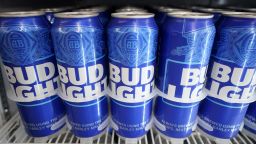Bud Light controversy cost parent company about $395M in lost

In the United States, the world’s largest brewer is counting the costs of the Bud Light controversy.
In the second quarter, AB InBev’s US revenue fell 10% due to slumping sales of its top brand. The company reported a 14% decline in sales to US retailers, underperforming the wider beer industry, primarily due to a decrease in the volume of Bud Light it sold.
North America’s revenue fell $395 million during the period compared to a year earlier.
Sales in Canada rose, suggesting that the slump was not limited to the United States and that Bud Light suffered even larger losses.
Following its sponsorship of transgender influencer Dylan Mulvaney, America’s former No.1 beer has been criticized by right-wing media and anti-trans commentators.
Bud Light’s public relations crisis – and sales fiasco – stemmed from Mulvaney posting an image of a custom Bud Light can on Instagram that month.
In response to her post, some anti-trans critics threw away their beer cans and called for a boycott. Kid Rock filmed himself shooting cases of Bud Light and ending the video with expletives about the brand.
Governor Ron DeSantis last month urged the state’s pension fund manager to consider legal action against AB InBev for its association with “radical social ideologies.”
Over this matter, the governor suggested the group had breached its duties to shareholders. As a response, AB InBev stated that it was serious about its responsibilities to investors.
In the meantime, LGBTQ+ advocates criticized the beverage giant for failing to support Mulvaney and the broader trans community. Despite Mulvaney’s disappointment over the company’s response, she expressed disappointment in the company.
As AB InBev’s CEO Michel Doukeris noted at its previous earnings release, it’s too early to determine how the firestorm will impact the company.
A financial support program was offered by the company to its wholesalers between June and December in an effort to limit the damage to its brand. It said Thursday that its share of the US beer market fell in the second quarter, though it stabilised between late April and June.
